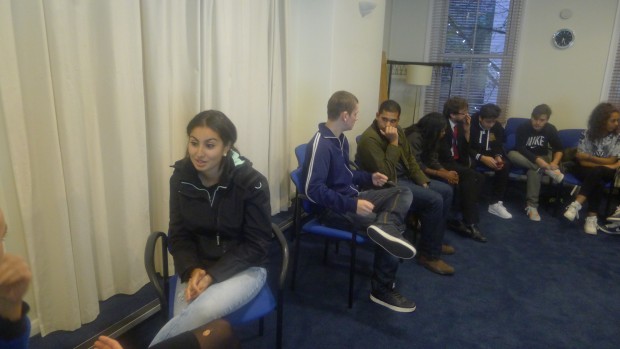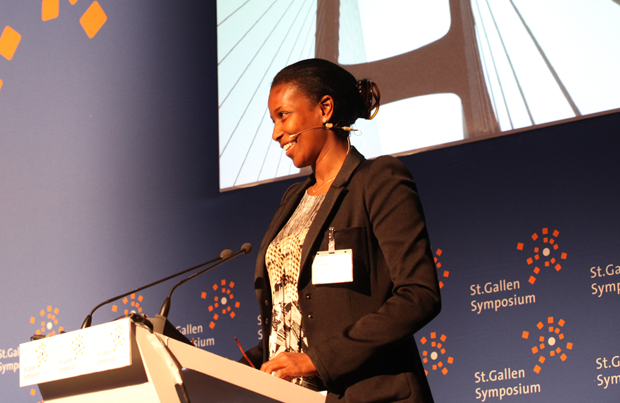13 Oct 2014 | Events

For this month’s Draw the Line event, Index on Censorship held a workshop to discuss what role the police should play in encouraging or protecting freedom of expression. The debate kicked off asking if the police should have a role in protecting free speech at all. The group’s opinion varied with some thinking it was not in their remit while others thought that the police ultimately restricted free speech.
Morgan Meaker, a member of our Youth Advisory Board, then interviewed the schools officer for the London borough of Southwark on what his views were on the police’s role in protecting free speech. He suggested that it was not the responsibility of the police, but the people who make the laws which protect our human rights. When questioned about the police’s involvement in the recent arrests of several trolls on Twitter he said that if someone is breaking the law and threatening someone then the police have every right to arrest that person, but with online abuse the issues become more complicated.
This gave the group more to think about as they took on some real-world case examples and had to decide how they would respond if they were a police officer. One of the case studies covered online abuse and the other the role of police during protests. The groups carefully considered how they might handle these situations and concluded that while there were no clear cut answers that the police did have a role, but it was difficult as they couldn’t create the laws and could only enforce them.
3 Oct 2014 | Campaigns, Statements
The European Court of Human Rights (ECHR) has proved itself a vital last line of defence in protecting free speech in the UK, not least in defending a free press.
It was the European Court that ruled Britain had acted unlawfully in gagging newspapers over Spycatcher, it was the European Court that ruled in favour of a journalist punished by the UK courts for refusing to reveal a source, and it is the court in which UK legislation on mass surveillance is currently being challenged to ensure continued protection for journalists‚ and their sources.
Under extensive plans mooted by the UK’s Conservative Party, to be introduced if it won the next election, it claimed ECHR judgements would only be advisory, rather than binding. Final rulings instead would be made by the London-based Supreme Court. The party also pledged to write a new British Bill of Rights, which would reduce or qualify existing rights. They have also suggested the UK government would withdraw from the European Convention if parliament and the British courts did not have the power to overrule ECHR judgements.
Index believes that any UK government that attempts to undermine the ECHR would provide countries with appalling human right records a ready-made excuse to ignore the internationally recognised standards that the court represents.
23 Sep 2014 | Events

Author: Minnesota Historical Society
**UPDATE 02/10/14: Index will be joined by the Schools Officer Pc for Southwark to discuss the police’s role in freedom of expression.**
The police play an important part in civil society but how far should they go in protecting free speech?
The recent protests in Ferguson have received international attention as police and protesters continue to clash, but are the police just doing their job and keeping the peace? This situation has been replicated all over the world as police and public battle over civil liberties both in the streets and online, but we want to know – what do you think?
For this month’s Draw the Line event, Index on Censorship wants to know if you think the police should do more to protect our right to free speech?
Join Index on Censorship and industry professionals as we debate, discuss and explore what role do you think the police should play in protecting our right to free speech and where do you draw the line?
WHEN: Thursday 9th October, 6pm
WHERE: Index on Censorship, 92-94 Tooley St, London, SE1 2TH
TICKETS: This event is FREE for under 25s but please RSVP here.
If you need any more information please contact Fiona Bradley on [email protected]
19 Sep 2014 | Academic Freedom, News and features, Politics and Society, Religion and Culture, United States

Ayaan Hirsi Ali at the University of St. Gallen in 2011 (Photo: International Students’ Committee/Wikimedia Commons)
Earlier this month, Yale President Peter Salovey used his address at the university’s freshman assembly to call for students to protect unfettered freedom of expression, labelling it “essential on a university campus”. Specifically, his speech dealt with the policing of university speakers by protesting student groups. He urged students not to participate in the types of activities that have forced prominent public figures out of speaking roles at other universities.
This address came in anticipation of Yale’s William F Buckley Jr. Program — a group dedicated to promoting intellectual diversity on campus — hosting Ayaan Hirsi Ali. The Dutch activist and writer has been accused of holding strong anti-Islamic views, and her work has been a source of controversy throughout her career.
The president’s advice was not heeded. The announcement of Ali’s inclusion in the speaker series was met with complaints by over 30 student organisations. Spearheaded by Yale’s Muslim Students Association, who wrote a letter and started a petition condemning the speech, groups of all makes attempted to get Ali removed from the docket or to get other speakers added to the event. Despite this, Yale’s faculty stood by the president’s message, and the event went ahead on 16 September.
This follows the case of a reverend at the university being forced to step down after he wrote a three sentence op-ed criticising an article in the New York Times. He argued that a piece on the rise of anti-semitism in Europe ignored the link between this and the Gaza conflict.
But these are not the only recent examples of free expression being limited on American campuses. Here are nine other universities that have faced free speech controversies in the past year.
CAL Berkeley
University of California Berkley chancellor, Nicholas Dirks, sent an email to students on 5 September entitled “Civility and Free Speech”. The email came at the start of the school year marking the 50th anniversary of the Free Speech Movement, a protest that helped lift the ban on political activities on campus and increased students’ free speech rights at universities around the world. The email, however, turned into a platform for Dirks to place qualifiers on students’ free speech, saying it should only be practiced “insofar as we feel safe and respected in doing so”. Dirks called for civility in free speech, which many, including some faculty members at the university, felt inhibited academic freedom.
Arkansas State University
Arkansas State University attempted to force football players to remove or modify crosses from their helmets, used to commemorate two former teammates who were killed in the last year. The symbol memorialising the former teammates was challenged by a group of outspoken atheists known as the Freedom from Religion Foundation who called the symbol inappropriate. The team has since changed it into a bar baring the initials of the fallen. One player, however, is suing the school, saying that he feels the university has censored the team.
University of Illinois at Urbana-Champaign
The University of Illinois at Urbana-Champaign revoked the hiring of Steven Salaita, an American-Indian studies and Israeli-Arab Relations professor, after he wrote anti-Israeli tweets in response to Israeli violence on the Gaza Strip. Tweets like, “When will the attacks on #Gaza end? What is left for #Israel to prove? Who is left for Israel to kill? This is the logic of genocide.” were posted on the first and second of August. The university claimed that current employees of the university would not be fired on the same grounds, but since Salata was merely promised a position and had yet to start working, the same rules did not apply.
University of Georgia
A group of students at the University of Georgia, represented by the Alliance Defending Freedom (ADF), have filed a lawsuit against the school after it adopted a policy that limits free speech to certain zones. These areas make up less than 1 percent of the campus and are open from 8am-9pm Monday through Friday for protest and other political demonstration. Protests on other parts of campus must be cleared 48 hours in advance by an administrator. ADF’s Travis Barham said in a press release, “Public universities are supposed to be the marketplace of ideas, and so they should promote and celebrate free speech, not quarantine it.”
Rutgers University
Former US Secretary of State Condoleezza Rice withdrew from her speaking opportunity at Rutgers University’s graduation commencement following student protests. Students were in uproar about the former politician’s involvement in the Iraq war, namely her signing off on the torture of Iraqi citizens. This was not the first time Rice faced protest as a commencement speaker. In 2006 students and faculty alike held up signs during graduation, voicing their displeasure over her inclusion.
Boise State University
Boise State’s chapter of the Young Americans for Student Liberty, a national organisation for education of libertarian values and the constitution invited gun law activist Dick Heller to be a keynote speaker at one of their campus events. The group, seemingly due to the controversial nature of the speaker’s opinions, was charged an additional sum of money as a security fee 24 hours before the event which had been scheduled for six weeks. This came just one week after the university forced a pro-life organisation to put up warning signs at two of their on campus events. Both of these cases were subjects of lawsuits citing the First Amendment right to freedom of expression as being violated.
Citrus College
A student at Citrus College in Glendora, California was threatened with removal from campus after he was caught petitioning against the spying of the National Security Agency outside of the school’s designated free speech zone. These areas make up just over one percent of university premises, with every other part of a campus labelled a “non-public forum”. The student sued, making it the second time in just over a decade the college faced legal action over a free speech issue. California has two laws that that protect free speech on campuses.
University of Massachusetts Amherst
In the autumn of 2013, the University of Massachusetts banned electronic dance music events following the death of one of their students due to an MDMA overdose. The death came at the end of a string of overdoses on campus and in the Massachusetts area and the ban was an attempt to curb this illegal drug use. Students responded with a peaceful protest which featured picketing, petitioning and flash mobs.
Iowa State University
Iowa State University banned t-shirts made by the school’s branch of the National Organisation for the Reform of Marijuana Laws. The school claimed the use of their mascot on the shirts was a trademark violation. The school filed a lawsuit against NORML after the image was published in a local newspaper, following pressure by state officials who did not want the school to be seen as pro marijuana reform. NORML asked for the case to be dismissed claiming ISU failed “to allege sufficient facts to establish any constitutional right in the use of ISU’s trademarks”.
This article was posted on Thursday 19 Sept 2014 at indexoncensorship.org



